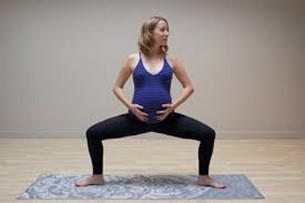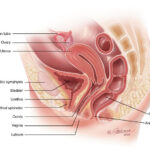“Yoga is about creating harmony within oneself and to create that harmony while pregnant meant my practices had to honor as well as include the process my body was going through to make a newborn child.”
-Sharmila Desai
Practicing Yoga During Pregnancy
Practicing yoga during pregnancy is a wonderful and beneficial way to manage this incredibly transitional period of life. A regular yoga practice can help the mother physically, mentally and emotionally prepare for labor and childbirth. Prenatal yoga helps a mother-to-be find balance as she navigates the changes happening within her body as well as her emotions. Studies show that women who practice yoga in pregnancy experience less or decreased episodes of anxiety and depression both during pregnancy and post-partum. They experience easier deliveries with fewer complications and have a lower incidence of C-Sections. Birth weights are improved, the incidence of pre-term labor are decreased and many common complications are prevented, lessened or avoided
During pregnancy yoga helps to ease common discomforts such as mood swings, nausea, shortness of breath, fatigue, swelling and more. Yoga gently strengthens, relaxes and opens the body in preparation for childbirth. And helps women accept and adjust to the flux and flow of hormonal and bodily changes allowing them to connect to wonder of life growing within.
A common misconception about yoga is that you need to be a human pretzel. You MUST get into all sorts of poses to ‘achieve’ yoga. This couldn’t be further from the truth.

Yoga is designed to enhance clarity and peace in the mind by practicing postures (asana), breath (pranayama) and meditation. Pre-Natal Yoga is all about nurturing, taking the time out to give back to yourself and your unborn child. Yoga is a way to destress, and connect to ourselves. At the same time a well-crafted practice will address your personal needs and concerns, physically, mentally, emotionally and spiritually at each stage of the journey.
How a woman chooses to practice during her pregnancy is deeply personal. Some with prior yogic experience may want to continue with many of her same practices (please see the special notations on the first trimester and the Don’t Dos below). Prenatal yoga takes into consideration the many changes both physically & mentally that happen during pregnancy. If your beginning yoga for the first time in pregnancy, it is best to go slow, seek the expertise of a qualified teacher, and above all LISTEN TO THE WISDOM OF YOUR BODY.
The First Trimester
The first trimester (first 12 weeks) is a critical time in your baby’s development. The fetus is implanting into the uterine lining and the risk of miscarriage is highest. The priority of the body is to rest and nourish allowing the baby to grow. Traditionally in India physical practice is discouraged at this time. Practice is geared to visualization, chanting, and gentle breathing exercises. Some yoga schools say it’s fine to continue practice in the first 12 weeks. If you want a physical practice in the 1st trimester get the approval of your midwife or Doctor. Then seek the direction of a qualified and experienced teacher. Your practice should be very gentle. Avoid twists, forward bends, and backbends. Any exercise or movement that puts stress or emphasis on the abdomen, hips, pelvis or back is to be avoided. The practice of yoga is more powerful than it appears.

Our culture often obsesses with the physical body. When a woman becomes pregnant, there is a sudden urgency to still do the things done before pregnancy. The is a belief that she must be ‘fit’ to have a perfect birth. Let’s let go of these misconceptions. Life is an ever changing, ever moving cycle. Let us instead ask ourselves each day “What do I need today?” “What does my body need today?” “What does my baby need today?” then, begin to move in that direction.
Pre-Natal Yoga - How do I start?
- After your 12-week check get approval from your Doctor or midwife to proceed with any form of exercise.
- Find a reputable, experienced Pre-Natal Yoga teacher or Yoga Therapist. Take the time before your first class to meet with the teacher and discuss your level of experience (or inexperience) and any medical concerns about your pregnancy.
- Above all LISTEN TO YOURSELF! Trust your instincts. You know what practices are comfortable and what aren’t. Communicate your feelings and needs to the teacher so that the practice can be modified to something more suitable.
- Practice comfortably, don’t push yourself. During pregnancy your body secretes the hormone relaxin to make your body more flexible in preparation for birth. Relaxin makes all joints more flexible and without care could lead to injury.
The Don’ts of Yoga during Pregnancy
Please note that all suggestions are generalized and that all yoga practices should be individualized. It’s always suggested that you work with a qualified teacher who can guide you practice to help you reach your highest state of health and wellness.
- Avoid Any Hot Yoga, (like Bikram Yoga)
- Avoid Laying flat on your back for extend periods of time -The weight of the uterus obstructs blood flow to the vena cava (a large vein carrying deoxygenated blood into the heart) and can reduce oxygenated blood to your baby. Sacral problems may also be heightened with the pressure of lying on your back
- Avoid Deep Twists (especially the ones that go against the body). Open twists (away from the center of the body) and lateral postures are fine in the 2nd and 3rd.

- Inversions like shoulder stand or headstand are to be avoided.
- Downward facing dog is fine up to 20 weeks then it is classified as an inversion.
- No abdominal crunching or sit ups.
- No deep back bends as this may put too much pressure on the spine
- Avoid deep forward bends – always allow room for your ever growing belly.
- If chanting, Avoid Maha Prana (asperated sounds).
- Avoid strong pranayama (breathing) practices that push rather than relax the mind and body.
Appropriate pre-natal yoga can be very helpful. The practice of yoga is personal journey toward health and wholeness. During pregnancy it is an unparalleled opportunity to connect with yourself and your baby. It can release tension helping one to feel more relaxed and at ease while physically and mentally preparing for labor and child birth. Breathing and meditation may be especially useful during the intense phases of birth.
Further Reading

The Benefits of Mantra and Chanting
The practice of mantra and chanting is experiencing a new popularity in modern spiritual and yoga practices today. But they are not new. Mantra and

Healing the causes of suffering – A four-step model for healing
Yoga Therapy as a Healing Modality Offerings like “Yoga for Back Pain” and “Yoga for Stress Relief” are common, and seemingly increasing every day. But

Natural Solutions for Abdominal Organ Prolapse
Dear Annie, I was diagnosed with bladder prolapse. The doctor recommends surgery. I’d like to avoid surgery. Is there anything I can do?
Thank you, this is a great question. There are several natural solutions that can help reduce symptoms and support the abdominal region and pelvic floor.

An Herbal Interlude with Oregano
Oregano (Origanum vulgar) Table of Contents Family – Labiatae or the Mint Family About Oregano Common Garden Oregano is an easy to grow addition to any

An Herbal Interlude with Catnip
Catnip – Nepeta cataria Family – Lamiaceae, the mint family Table of Contents Common Names Catnip is also commonly called Catmint, Catswort, Catnep, and Field

Natural Solutions for Shingles
Dear Annie, I have shingles; it is painful. Is there anything that can help? OH, Dear Friend, I’m so sorry. Shingles can be very painful.

An Herbal Interlude with Common Mullein
Common Mullein (Verbascum Thapsus) Family –Scrophulariaceae or the figwort family Table of Contents My friendly Mullein Rant Common Mullein is one of the top 10

An Herbal Interlude with Black Cumin (Nigella sativa)
Black Cumin (Nigella sativa) Family – Ranunculaceae or Buttercup family Black Cumin is an AMAZING herb. I became aware of it only recently during my

An Herbal Interlude With Arnica
Arnica Botanical Names Arnica cordifolia, A. chamissonis, A. montana, and others More years ago than I can count, Arnica was one of the first plants

Bee Stings and Bug Bites
This summer my family has been hanging out in the pool almost every day. It’s a small pool, but big enough to float around and

Natural Solutions for Peripheral Edema
Dear Annie, do you have any ideas about using natural solutions for peripheral edema or swelling in the legs? I have edema in my left

An Herbal Interlude with Saw Palmetto
Saw Palmetto is the gold standard for male reproductive issues. It also has affinities for the respiratory, digestive, immune and the genitourinary system.

Benign Prostatic Hyperplasia (BPH)
Benign Prostatic Hyperplasia (BPH) is a chronic condition that affects 50-60% of all men over the age of 60. The good news is that Men have been successfully using herbs and yoga therapy to manage the problem for well, almost ever.

Prostate Enlargement with High PSA Levels
Dear Annie – Can you offer any direction for prostate enlargement with high PSA Levels? I am a 70-year old man and have been going

Natural Treatments for Giardia
Natural treatments for giardia involve a multi-dimensional approach. First we must stop the parasites growth, next we’ll want to support gut health and more

COVID19 Closing of the Lungs
The next stage of illness is called COVID19 Closing of the lungs or the Plague Closes the Lungs. Yuck! And that pretty much sums it

Fever from an herbalists perspective
Hello Plant Friends, For the past few weeks, we’ve been talking about the COVID-19 virus. Focusing on symptoms, stages of progression and treatment strategies. This

Prevention of COVID-19 from an Herbalist Perspective
Using foods and herbs as prevention strategies, we want to focus on a healthy lifestyle and strengthening our bodies natural built-in defenses.

Herbal/Drug Interactions and Blood Thinning Medications
Dear Annie, I am at a loss since I began taking blood thinners last year. I love all my herbs and essential oils, but have been cautioned by my pharmacist not to use them. Please tell me more about the interactions between herbs and blood thinning medications.

Natural Solutions for Acid Reflux and GERD
Over 60 million Americans experience acid reflux (also known as heartburn) at least once a month. Some studies suggest that more than 15 million Americans, or about 18% to 27% of the total population, experience heartburn symptoms daily.

Urinary Infections in Dogs
Herbs that may help prevent urinary infections in dogs, as a side benefit, may also help with urinary incontinence and tone the colon wall.

Erectile Dysfunction Following Prostate Surgery
Dear Annie, I had my prostate removed due to cancer about 8 months ago and am now having problems with intimacy. Would a testosterone booster help? Any other ideas?

An Herbal Interlude with Blessed Thistle
Blessed Thistle was considered a heal-all in medieval Europe where it was used as a primary treatment for the bubonic plague. Today it’s used to improve digestion and to treat liver and stomach problems.

Natural Solutions for Hair Health
Dear Annie, What would you suggest I look for in a hair serum to promote scalp, Hair health and growth? Since the birth of my son 5 years ago, I’ve noticed my hair thinning. I don’t feel like I’m losing my hair but notice a lot on my brush and it feels like my hair is thinner.
The consistency of hair can often change at different times in life and is often connected to a major life change, like having children, menopause, age or illness. Hair (all over our body) is linked to the health of the entire system and is an indicator of your overall state of health.

Herbal Spotlight – Triphala (The Three Fruits)
Triphala, is an ancient Ayurvedic formula made up of a combination of three fruits, native to the Indian subcontinent. Amalaki (Emblica officinalis,) Bibhitaki, (Terminalia belerica,)

Nighttime or Nocturnal Leg Cramps
Nighttime or Nocturnal leg cramps are a common problem. Up to 60% of all adults will experience this painful symptom, most never report it to their doctor.
References
Natalie Hudson http://babyhintsandtips.com/exercise-tips-yoga-during-pregnancy/
https://link.springer.com/article/10.1007/s00737-008-0214-3. Effects of a mindfulness-based intervention during pregnancy on prenatal stress and mood: results of a pilot study
https://www.ncbi.nlm.nih.gov/pubmed/15865489
https://www.yogauonline.com/yogau-wellness-blog/studies-show-consistent-benefits-prenatal-yoga
Systematic Review of Yoga for Pregnant Women: Current Status and Future Directions https://www.hindawi.com/journals/ecam/2012/715942/
Disclaimer
The statements and ideas presented here are not intended to diagnose, treat, cure, or prevent any disease or condition. They have not been evaluated by the FDA. All ideas presented are for the sole purpose of education. To help you take control of your own health. If you have a health concern or condition, consult a physician. We suggest that you always consult a medical doctor before modifying your diet, using any new product, drug, supplement, or doing any new exercises.
These statements and products have not been evaluated by the FDA. They are not intended to diagnose, treat, cure, or prevent any disease or condition. If you have a health concern or condition, consult a physician. Always consult a medical doctor before modifying your diet, using any new product, drug, supplement, or doing any new exercises.
Herbs taken for health purposes should be treated with the same care as medicine. Herbal remedies are no substitute for a healthy diet and lifestyle. If you are serious about good health, you’ll want to combine diet, exercise, herbals, a good relationship with your doctor and a generally healthy lifestyle. No one of these will do it alone.
This information is designed to be used as part of a complete health plan. No products are intended to replace your doctor’s care, or to supersede any of his/her advice or prescriptions.
